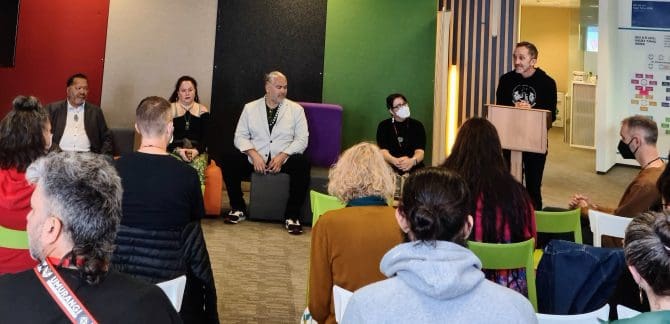Te Waipounamu House, Te Rūnanga o Ngāi Tahu
Sunday 4 September 10am to 2pm
My Father once told me that storytelling is an intrinsic part of te Ao Māori - the Māori World. It is one of the ways we intergenerationally transfer knowledge. Many of our stories are stored in oral traditions and histories preserved in the names of land features and places. They recall events, experiences and people who make up our history.
But what about the stories that recall events, experiences and people of our present or even recent past? How do we preserve these? Must they always be in written form or is there an ability to have a shared space of written and spoken word which are equally valued? These were some of the questions I pondered as I headed to this wānaka on a beautiful Sunday morning with similar likeminded people.
Opened with karakia and whakatau from Joseph Hullen (Kāi Tūāhuriri), a Kāi Tahu storyteller, historian and whakapapa exponent, Hullen set the tone for the gathering, serious but tinged with humour, laughter and whakawhānaunkataka. Rocky Roberts (Kāti Kurī, Kāti Hinematua), Kāi Tahu radio personality, storyteller and all round good guy, facilitated the proceedings. His unique sense of fun ensured that proceedings flowed seamlessly with thought-provoking segues from one presenter to the next.
Nic Low must be commended for his panel selection of amazing Māori and Pasifika storytellers, none more so than this ‘creative crew’ that awaited us. Working in different genres from poetry to activism to film and stage, they provided insight into their world. Shared their aspirations of future pathways for indigenous writers and their visions of what future indigenous storytelling looks like.
Ended my WORD Festival time with an incredible closed door hui at Te Whare O Te Waipounamu with other indigenous writers, thinkers and Ngāi Tahu speakers. SO GOOD, like new paradigm unlocked good whew🔥 pic.twitter.com/10RMbMspcI
— Jessicoco Hansell (@alofanui) September 7, 2022
Thoughts were offered of ways to tell our own indigenous stories, by us, for us and to us through the interweaving of spoken and written word in spaces dedicated to honouring our oral traditions. Embedding our narrative into the landscape through the revival of our tipuna place names. Weaving our words into our architecture so my town or city reflects me. Naturalising not only our stories but more importantly our reo which has been systematically estranged from us. Creating safe spaces like Wheke Fortress where, Māori and Pasifika come to discuss nothing in particular and just hold space to do what the gods want us to do. Spaces where, as indigenous peoples, we can dear to dream our dream without having to explain or justify, relieved of that ‘sense of duty’ eating into our creativity. Within those spaces there are no assumptions about who we are, we qualify. Our story is known not mood boarded, we are the true source.
Discussion centred at times around navigating the mainstream writing world, noting not only the loneliness that comes with being the sole brown writer in a room full of non-brown writers; but at times, the unrealistic expectation placed on such people, by that room, to be their indigenous voice or face.
Now please don’t think that this was by any means a radicalised bunch of people mood-boarding the revolution on a Sunday morning. Rather, it was a group of creative people who are inspired to aspire to step into their voices and their truth.
Listening to the young voices on the panel I was impressed and encouraged by their dynamic, fresh perspective which I found exciting to hear and ponder. Special mention must be given to Kera Sherwood-O’Regan, who in spite of the big shadow her last name can cast, has managed to not only step out from it but well and truly created her own truth. While echoes of her parents and members of her Father's family can be heard in her phrasing or terminology, her voice is her own. A self-proclaimed activist, Sherwood-O’Regan, added another dimension to the discussion which was quite unique and insightful for someone so young. "Understanding the responsibility of being good stewards of knowledge, collective ownership of knowledge, accountability to the collective and how to be accountable when you’re not part of that collective, tuakana and teina mentoring" – were just some of her thought worms. Sherwood-O’Regan is right these are considerations for all storytellers.
I left the wānaka believing the future is ours to write, to create safe nurturing spaces where likeminded creative people come to ‘hold space and do what the gods want us to do’, to step into my truth and own my voice. I look forward to seeing what creative works are produced in the coming year, but for now I’m off to find some of the current works on offer – I encourage you to do the same.
He Waiata Hou: Indigenous Writers Panel consisted of:
- Maurice Manawatu, Kāti Kuri (ki Kaikoura) historian, storyteller and whakapapa exponent;
- Kera Sherwood-O’Regan, (Kāi Tahu) Human rights and climate campaigner, Kāi Tahu storyteller, communications professional;
- Coco Solid a.k.a Jessica Hansell, (Māori, Samoan, German) artist, musician, writer, director and actor;
- Victor Rodger ONZM, (Samoan, Pākehā/Palagi) journalist, actor and award winning, critically acclaimed playwright;
- Tusiata Avia MNZN, (Samoan, Pākehā/Palagi) poet, performer and children’s author
My thanks to Nic Low and WORD for providing this opportunity to attend this amazing wānaka. Thank you to Te Rūnanga o Ngāi Tahu for their manaaki tāngata, manaaki kaupapa. Kia koutou ngā tīheru tokotoru, Rocky, Maurice and Joseph, it’s always a pleasure sharing time and space with you.
WORD Christchurch Festival 2022 Coverage
Visit our page of WORD 2022 Festival coverage and info
WORD Christchurch information
- More photos from He Waiata Hou – Indigenous Writers Hui
- Visit the WORD Christchurch website
- Follow @wordchch on Twitter
- Like @wordchch on Facebook
- Follow @wordchch on Instagram




Add a comment to: He Waiata Hou – Indigenous Writers Hui: WORD Christchurch 2022